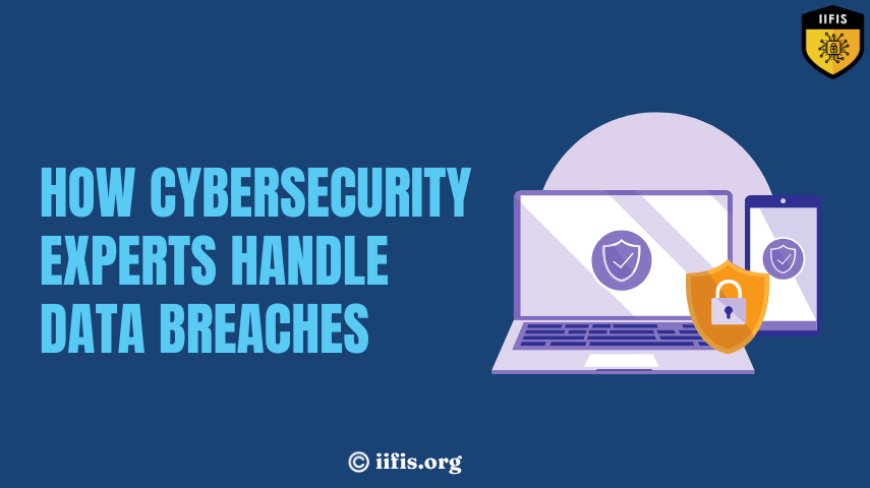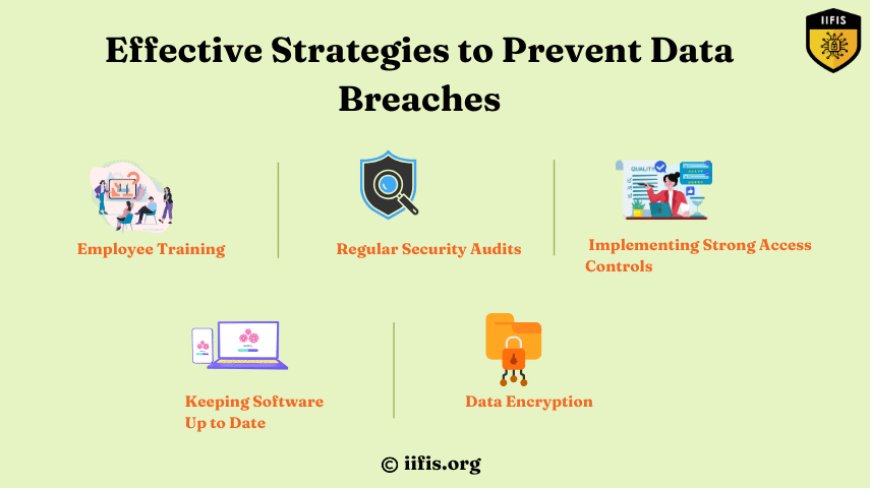How Cybersecurity Experts Handle Data Breaches
Learn how cybersecurity experts manage data breaches, including detection, response, and strategies to safeguard sensitive information.

A few months ago, my company experienced a data breach, which was stressful. While everyone was concerned, a team of skilled cybersecurity professionals quickly took charge. They assessed the damage, protected sensitive data, and kept us informed. Their calm, strategic approach made me realize how essential cybersecurity experts are in managing data breaches and keeping our data safe.
Data breaches can lead to financial loss, reputation damage, and legal issues. It's crucial to understand how cybersecurity professionals respond to these incidents. Programs like IIFIS's cybersecurity certification help equip experts with the skills to handle such crises. Here's an overview of how cybersecurity professionals manage data breaches and some key steps businesses can take to prevent them.
What Is a Data Breach?
A data breach happens when unauthorized individuals gain access to confidential data. This could include personal information, financial records, trade secrets, or any other sensitive data that needs to be protected. Data breaches can have severe consequences, so having a solid response plan is crucial for any organization. Cybersecurity experts are trained to handle breaches and minimize their impact. They understand the technical details and legal requirements involved in responding to a breach, helping companies recover faster and more securely.
Data breaches can occur for a variety of reasons. Some common causes include hacking, phishing attacks, insider threats, and weak security practices. Studies show that a large percentage of organizations have experienced a data breach, which underscores the need for strong security measures and trained professionals to deal with these issues.
The Role of Cybersecurity Experts
Cybersecurity professionals specialize in protecting networks, systems, and data from cyberattacks. Their primary job is to identify system vulnerabilities, put security measures in place, and respond quickly when something goes wrong, such as a data breach. These experts usually hold certifications like Certified Information Systems Security Professional (CISSP) or Certified Ethical Hacker (CEH), which prepare them to handle a wide range of cyber threats.
Cybersecurity professionals are not only responsible for responding to incidents but also for staying updated on the latest trends and technologies in security. Their role involves a mix of technical expertise and strategic thinking to ensure that organizations can recover from cyberattacks while strengthening their defenses against future incidents.
Steps Taken by Cybersecurity Experts During a Data Breach
1. Immediate Response
-
Assess the breach: Determine the source and scope of the attack.
-
Identify compromised data: Understand which data has been exposed.
-
Contain the breach: prevent further damage and isolate affected systems.
2. Communication
-
Develop a communication strategy: Inform stakeholders, customers, and regulators about the breach.
-
Ensure transparency: Provide clear, timely updates to all affected parties.
-
Compliance with laws: Meet legal requirements for notifying affected individuals and authorities.
3. Investigation
-
Analyze logs: Review network logs, system logs, and traffic data to understand how the breach occurred.
-
Collaborate with forensic teams: Engage external experts if necessary to investigate advanced attacks.
-
Gather evidence: Document the breach for legal purposes and to inform future responses.
4. Remediation
-
Fix vulnerabilities: Patch any security flaws that allowed the breach to occur.
-
Update security protocols: Strengthen existing measures to prevent similar incidents.
-
Implement new defenses: Introduce technologies like multi-factor authentication and intrusion detection systems.
5. Documentation
-
Record all actions: Keep detailed notes of the breach timeline, decisions made, and actions taken.
-
Improve response plans: Use documentation to update incident response strategies.
-
Legal reference: Documentation can be important for legal inquiries and insurance claims.
Effective Strategies to Prevent Data Breaches
1. Employee Training
-
Educate staff on security best practices, phishing, and data protection.
-
Interactive training: Use real-life scenarios and simulations to engage employees.
-
Ongoing education: Regular refresher courses to stay up-to-date on threats.
2. Regular Security Audits
-
Conduct audits to identify vulnerabilities in the organization’s security infrastructure.
-
Review security measures: Ensure network configurations, access controls, and software updates are effective.
-
Proactive approach: Regular audits help address weaknesses before they are exploited.
3. Implementing Strong Access Controls
-
Restrict access to sensitive data by using role-based access control (RBAC).
-
Principle of least privilege: Only grant access to the minimum data needed for each role.
-
Monitor user activity: Track who accesses sensitive data and when.

4. Keeping Software Up to Date
-
Apply security patches as soon as they become available.
-
Automated patch management systems help ensure timely updates.
-
Update software to address vulnerabilities that hackers might exploit.
5. Data Encryption
-
Encrypt sensitive data both in transit and at rest.
-
Use strong encryption protocols to protect data from unauthorized access.
-
Secure communication: encryption ensures that data remains protected even if intercepted.
The Importance of Incident Response Plans
-
Prepare for breaches: Having a well-defined incident response plan can minimize the impact of a data breach.
-
Roles and responsibilities: Clearly define who does what in the event of a breach.
-
Regular testing: Conduct tabletop exercises to ensure the plan is effective and up-to-date.
-
Communication protocols: Outline how to communicate with internal teams, customers, and regulators during a breach.
The Future of Cybersecurity
-
AI and Machine Learning
-
AI will enhance threat detection by analyzing data patterns and identifying anomalies faster.
-
Zero Trust Security
-
Trust is never assumed; every user and device must be verified before accessing systems.
-
Cloud Security
-
As more companies move to the cloud, stronger security measures, including advanced encryption, will be essential.
-
Privacy and Compliance
-
With stricter data privacy laws, businesses will focus more on compliance and protecting sensitive data.
-
Cybersecurity Automation
-
Automation will help detect and respond to threats faster, improving efficiency in security operations.
Handling data breaches requires a well-coordinated response from skilled cybersecurity professionals who are trained to manage and mitigate the impact of such incidents. By obtaining relevant certifications, like those offered by IIFIS, individuals can gain the necessary expertise to prevent, detect, and respond to security threats effectively. Becoming a certified cybersecurity expert not only enhances your career prospects but also prepares you to tackle the evolving challenges in the cyber world. As cybersecurity continues to be a critical area for organizations, pursuing professional certification is a smart step toward mastering the skills needed to protect sensitive data.
























